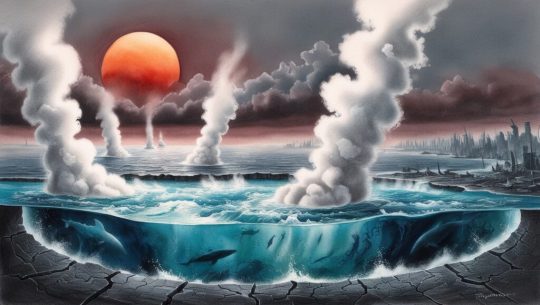#boilingpoint
Explore tagged Tumblr posts
Text

It is well known that water boils at 100°C. But this is only true at sea level, since the boiling point depends on atmospheric pressure: the higher the altitude, the thinner the atmosphere, and the lower the boiling point. At sea level, water boils at 100 °C (212 °F). For every 500-foot (150 m) increase in elevation, water’s boiling point is lowered by approximately 0.5 °C. At 8,000 feet (2,400 m) in elevation, water boils at just 92 °C (198 °F). Boiling as a cooking method must be adjusted or alternatives applied.
#sciencememes #physics #chemistry #waterblog #boilingpoint #altitude #atmosphericpressure #highaltitude #cookingscience #culinaryphysics #elevationeffects #foodscience #scientificfacts #didyouknowfacts #interestingfacts #mindblown #scienceexplained #howitworks #highaltitudecooking #cookingtips #recipeadaptations
#research#science#biotechnology#technology#sciencenews#nature#innovation#health#ocean#sciencememes#physics#chemistry#waterblog#boilingpoint#altitude#atmosphericpressure#highaltitude#cookingscience#culinaryphysics#elevationeffects#foodscience#scientificfacts#didyouknowfacts#interestingfacts#mindblown#scienceexplained#howitworks#highaltitudecooking#cookingtips#recipeadaptations
2 notes
·
View notes
Text

#IFTTT#Flickr#flicrkrfriday#steam#vapor#chaleira#caldeira#chá#café#fervura#ebulição#água#kettle#boiler#tea#coffee#boil#boiling#water#pava#caldera#té#hervir#hervor#ebullición#puntodeebullición#pontodeebulição#boilingpoint#photography#photo
0 notes
Text
What If the Oceans Began to Boil 2025

What If the Oceans Began to Boil 2025
Imagine waking up one morning to find the oceans — the lifeblood of our planet — starting to boil. The waves no longer gently crash against the shore, but instead rise as searing steam clouds. The skies darken with vapor, and marine life begins to vanish in seconds. This chilling scenario isn’t a scene from a sci-fi film. It’s a hypothetical journey into what could happen if Earth’s oceans truly began to boil. Let’s dive deep into this wild “what if” and explore its consequences, mechanisms, and the cascading impact it would have on the entire planet. The Boiling Point of Water: Why It Matters To understand the magnitude of this scenario, we first need to revisit some basic physics. Water boils at 100°C (212°F) at sea level under normal atmospheric pressure. But the ocean isn’t a kettle — it’s a vast, interconnected system that covers over 70% of Earth’s surface. Because of pressure differences at various ocean depths, water deep down requires significantly more heat to boil. For example, at 1,000 meters (about 3,280 feet) below sea level, the pressure is around 100 times higher than at the surface. At that depth, water would only boil if heated to roughly 300°C (572°F). For the oceans to begin boiling, something catastrophic must increase Earth's temperatures drastically — possibly due to extreme solar radiation, a powerful gamma-ray burst, or an artificial event like a runaway greenhouse effect on steroids. What Could Cause the Oceans to Boil? Let’s explore a few extreme hypothetical causes: 1. A Runaway Greenhouse Effect Earth's atmosphere traps heat via the greenhouse effect. However, if too many greenhouse gases accumulate (CO₂, methane, water vapor), a feedback loop could occur. Venus is a real-world example — scientists believe its oceans boiled away long ago due to such an effect. If Earth followed a similar path, temperatures could skyrocket past the boiling point of water. 2. Massive Solar Flare or Gamma-Ray Burst An intense solar flare or gamma-ray burst aimed directly at Earth could potentially disrupt the atmosphere and lead to catastrophic heating. While unlikely, if such an event did happen, it could rapidly push global temperatures to extreme levels. 3. Artificial Experiments Gone Wrong In another wild scenario, advanced civilizations experimenting with planetary engineering (geoengineering) or alien technologies might accidentally trigger heat amplification mechanisms that spiral out of control. Immediate Effects on the Planet If the oceans began to boil, the consequences would be swift and apocalyptic: 1. Mass Extinction of Marine Life Most marine species cannot survive beyond temperatures of 40°C (104°F). Boiling temperatures would instantly kill off nearly all marine organisms — from plankton and coral reefs to massive whales. This collapse would destroy ocean ecosystems and the global food web. 2. Gigantic Steam Clouds and Atmospheric Collapse Boiling oceans would release trillions of tons of water vapor into the atmosphere. Since water vapor is itself a potent greenhouse gas, it would amplify global warming further. The skies would become shrouded in thick clouds, likely blocking sunlight — yet the trapped heat beneath could still rise due to infrared radiation imbalance. 3. Loss of Oxygen Supply Phytoplankton in the ocean produce over 50% of Earth’s oxygen. If oceans boiled and phytoplankton perished, the planet’s breathable oxygen supply would rapidly decline. Within weeks or months, oxygen levels could fall dangerously low. 4. Sea Level Rise & Evaporation Paradox As the oceans turn into steam, water levels would seem to decrease. However, due to rapid glacial melt caused by heat, there might be an initial, massive surge in sea levels before everything turns to vapor. Coastal cities would vanish quickly, only to later dry up.




Long-Term Consequences 1. Atmospheric Transformation Our planet would begin to resemble Venus. The atmosphere would become thick, unbreathable, and saturated with steam. Temperatures could rise past 300°C (572°F), making the surface completely uninhabitable. 2. Crustal Instability As the water cycle collapses, and heat penetrates deeper into the Earth’s crust, we could see an increase in tectonic and volcanic activity. Ocean floor pressure changes might cause earthquakes and the release of methane hydrates — amplifying the greenhouse effect. 3. Loss of the Hydrological Cycle Without liquid oceans, there would be no rain, no snow, and no rivers. Plants and animals on land would perish. Farming would be impossible. Water, the fundamental resource for life, would no longer cycle through the environment. 4. Collapse of Civilization Global infrastructures — food, energy, communications — would collapse within days. The energy demand for cooling systems and survival would skyrocket. Governments would likely fail. Humanity, if it survives at all, would be forced underground or into space-based shelters. Could Humanity Survive? In such a dire situation, survival would depend on preparation, technological advancement, and a bit of luck. Some potential survival strategies could include: - Underground cities with closed-loop life support. - Space colonies (e.g., Moon or Mars bases). - Cryogenic sleep for future revival. - Artificial oceans and atmospheric generators in shielded environments. However, these solutions would only be accessible to a small fraction of the global population. The vast majority of life — human and non-human — would be doomed. Scientific Lessons from This Hypothetical While this scenario sounds far-fetched, it teaches us valuable lessons: - The climate system is delicate. Even small changes can lead to cascading effects. - Oceans regulate Earth’s temperature and life cycles. Without them, Earth becomes a furnace. - Geoengineering and unchecked greenhouse gas emissions are not just theoretical concerns; they could one day create irreparable harm. Final Thoughts What if the oceans began to boil? The short answer: mass extinction, climate chaos, and the end of civilization as we know it. The long answer, as we’ve seen, involves understanding the systems that make life on Earth possible. While this scenario is purely speculative, it reminds us why protecting Earth’s delicate balance is not just good science — it's a necessity. Let’s never boil the kettle of the planet. 🔗 Related Educational Reads from Our Blogs: What If Dreams Could Be Recorded and Played Back 2025 https://edgythoughts.com/what-if-dreams-could-be-recorded-and-played-back-2025 What If Time Works Differently in Deep Space 2025 https://edgythoughts.com/what-if-time-works-differently-in-deep-space-2025 📖 Learn More About Oceanic Science: https://en.wikipedia.org/wiki/Ocean Read the full article
#1#100#1000#104#2#2025-01-01t00:00:00.000+00:00#2025https://edgythoughts.com/what-if-dreams-could-be-recorded-and-played-back-2025#2025https://edgythoughts.com/what-if-time-works-differently-in-deep-space-2025#212#3#300#3280#4#40#50#572#70#agriculture#animal#apocalypticandpost-apocalypticfiction#atmosphere#atmosphereofearth#atmosphericpressure#biologicallifecycle#blog#boiling#boilingpoint#carbondioxide#civilization#climate
0 notes
Photo

Boiling Point (2021) ★★★★★★★★☆☆
1 note
·
View note
Video
Boiling Point | Trailer - BBC | Stephen Graham , Vinette Robinson , Alic...
0 notes
Text

5 notes
·
View notes
Link
There’s a question whispering through the cracks of broken systems and bloodied truths: At what point do Americans start to care that their country is being controlled by people who despise them? Not disagree with them. Not hold different views. No—despise them. This isn’t political theater anymore. It’s something colder, older, and far more sinister. We are being ruled by people who see us as cattle. No—livestock gets better treatment. At least they’re fed to fatten, not to poison. Look around. Do you think it’s incompetence that makes grocery store shelves look like a Third World market while billionaires rake in record profits? Is it mere coincidence that every new policy seems tailored to kneecap the working class, gut the middle, and swell the elite?
0 notes
Text
What are the Causes and Effects of Changes in Matter?
Matter is anything that occupies space and has mass.x the states of matter are the distinct forms that different phases of matter can take on – solids, liquids, and gases. The transition between these states is known as changes of state. This phenomenon occurs when matter absorbs or releases energy, such as heat, leading to a transformation in its physical properties.
Reasons behind Changing States of Matter
Changes of state occur due to the internal energy of the particles within matter. The movement of particles in a substance is directly influenced by the amount of energy they possess. When energy is added or removed from a substance, it affects the interparticle forces and leads to a change in the arrangement and movement of particles. This alteration results in the transition between states of matter.
For example, when heat is added to a solid, the energy causes the particles to vibrate more rapidly, breaking the bonds that held them in a fixed position. This results in the solid melting into a liquid state. Conversely, when heat is removed from a liquid, the particles lose energy, slowing down and forming bonds with neighboring particles, resulting in the liquid solidifying into a solid state.
Understanding the reasons behind changing states of matter provides insights into the behavior of different materials under varying conditions. It showcases the dynamic nature of matter and how it responds to its environment.
Changes of state refer to the transitions matter undergoes between the three states: solids, liquids, and gases. These transformations are vital in various natural processes and everyday activities, shaping the physical properties of substances.
Changes between Liquids and Solids
When transitioning between liquids and solids, two common processes occur:
Freezing
Freezing is when a liquid changes liquid change into a solid state when its temperature drops below its freezing point. This transition involves the formation of an ordered structure as the particles slow down and arrange themselves into a fixed position.
Melting
Melting is the opposite of freezing, where a solid changes into a liquid state when heated above its melting point. This transition disrupts the ordered structure of the solid, allowing the particles to move freely and flow.
Changes between Liquids and Gases
Moving from liquids to gases and vice versa involves the following transformations:
Vaporization
Vaporization is the process by which a liquid changes into a gas state. This can occur through evaporation, where molecules gain enough energy to escape the liquid’s surface, or boiling, where the entire substance reaches its boiling point and vaporizes.
Condensation
Condensation is the reverse of vaporization, where a gas transitions into a liquid state. This occurs when gas molecules lose energy, slow down, and come together to form a liquid.
Changes between Solids and Gases
Changing states between solids and gases involves the following process:
Sublimation
Sublimation is the direct transition of a solid into a gas without passing through the liquid phase. This occurs when the solid’s particles gain enough energy to break free from their fixed positions and form a gas.
Causes and Effects of Changes in Matter
The causes of changes in matter can be diverse, but they are fundamentally rooted in the principles of thermodynamics. Changes in temperature and pressure alter the energy state of particles within matter, leading to changes in their arrangement and mobility.
These changes have profound effects on our daily lives and the natural world. For instance, the water cycle relies on changes of state—evaporation from oceans, condensation into clouds, and precipitation back to earth.
Understanding the changing states of matter elucidates the fundamental principles governing the behavior of substances. These transitions highlight the dynamic nature of matter and its ability to adapt to different conditions. By recognizing the reasons behind these changes and their effects, we gain a deeper appreciation for the complexity of the physical world.
For further insights into related concepts, we invite you to explore our blog section. If you seek personalised online tuition services, Tutoroot offers exceptional options. Our online physics tuition is designed to clarify any doubts you may have about various concepts. Book a FREE DEMO session by clicking here.
0 notes
Text



"athena, that restless goddess whose schemes spun on and on. she had fought to bring her hero home, to see him lifted among his people, for her honor and his. to hear him tell the tales of his victories, of the deaths they had dealt to the trojans together. but i remembered the greed in her eyes when she spoke of him: an owl with a kill in its claws. her favorite could never be allowed to grow dull and domestic. he must live in action's eye, bright and polished, always striving and seeking, always delighting her with some new twist of cleverness."
i thought i would upload my fandesign for the lovely grey-eyed pallas athena! i am not immune to arbiter athena agenda, since i love the idea that outis might have some sort of relationship (and favor) with the head. in general i want to see more fandesigns for characters that might pop up in outie's canto!
art credits: cornbab, Boilingpoint, and bok_cms on crepe 🩶💚
77 notes
·
View notes
Text

🔍 Distillation: A Key Separation Technique in Chemistry
Distillation is a fundamental separation process used to purify liquids based on differences in their boiling points. It involves heating a liquid mixture to form vapor and then cooling the vapor back into liquid form to collect individual components. This method is widely applied in industries such as petrochemicals, alcohol production, water purification, and pharmaceuticals. Types of distillation include simple, fractional, steam, and vacuum distillation, each tailored for specific mixtures and applications.
International Chemistry Scientist Awards
Website: chemistryscientists.org
Contact us: [email protected]
Nominate now: https://chemistryscientists.org/award-nomination/?ecategory=Awards&rcategory=Awardee
#sciencefather#researchawards#Professor,#Lecturer,#Scientist,#Scholar,#Researcher#Distillation#SeparationTechnique#ChemicalEngineering#FractionalDistillation #SimpleDistillation#VacuumDistillation #SteamDistillation#PurificationProcess #BoilingPoint#LabTechniques#Petrochemicals#WaterPurification#ChemistryFacts#IndustrialChemistry#OrganicChemistry
👉 Don’t forget to like, share, and subscribe for more exciting content!
Get Connected Here: =============
Blogger :https://www.blogger.com/blog/post/edit/6961521080043227535/467226973388921229
Twitter : https://x.com/chemistryS79687
Pinterest : https://in.pinterest.com/chemistryaward/
Instagram: https://www.instagram.com/alishaaishu01/
Youtube : https://www.youtu
be.com/channel/UCAD_pDvz3ZHqv_3hf-N0taQ
0 notes
Text
Wheelbarrow facebuster cutter combination
• occurring substance
• occurring uranium emits [alpha]rays
• occurring water
• occurring uranium
• occurring quantities
• occurring particle
• occurring thereby groups
• occurring gas
• occurring elements
• occurring element
• occurring boilingpoint
• occurring properties of elements
• occurring multiples of
• occurring compounds of uranium
• occurring conceptions
• occurring summary
• occurring compound
• occurring years
• occurring explosion
• occurring minute quantity of air
• occurring oxygen
• occurring less
• occurring composition
• occurring property of the substance
• occurring hydrogen
• occurring others
• occurring temperature
• occurring methods of measurement
• occurring formation
• occurring gram of radium
• occurring x
• occurring radioactivity
• occurring inquiry
• occurring substances
• occurring property of the substances
• occurring distinct substances
• occurring minute particles
• occurring class of elements
• occurring things
• occurring times
0 notes
Text

This Wednesday, "From The Other Side Live Show: Boiling Point" will delve into the escalating tensions in the Middle East, spurred by Israel's military actions in Gaza. This intensification comes as Egypt hints at halting the peace treaty from the '70s, alongside Syria's warnings of potential conflict, Iraq's demand for the withdrawal of foreign troops, and Saudi Arabia's cautioning of grave consequences. Dave returns to join Duke in the studio for an in-depth discussion on these unfolding events.
#MiddleEastTension #IsraelGaza #EgyptPeaceTreaty #SyriaWarThreat #IraqForeignTroops #SaudiArabia #DaveAndDuke #BoilingPoint
FromTheOtherSide 🇧🇾 #Minsk #Belarus watch us live on rumble
0 notes
Text

Coraleye: Well, I guess you've made your choice then.
Tycho: Absolutely.
Coraleye: And you realize that once you leave, you and I are done, right?
Tycho: Yep, that's the idea!

Coraleye: [sniffles] Wow... And there's nothing I could do to change your mind?
Tycho: What could you possibly have to say that would make me change my mind?

Coraleye: I don't want you to leave. You can't be sure I was going to pick Morgyn, I wasn't even sure. But if you leave...

Tycho: I'll make the choice for you. Pick them. I'm done. We're done.
Coraleye: No. You're just mad. Tell me you don't mean that, Tycho.

Tycho pursed his lips together and took a deep breath, bracing himself for the pain that he knew would hit when he looked into Coraleye's crying eyes.
Tycho: I mean it.
55 notes
·
View notes
Note
SORRY I ACCIDENTALLY UNFOLLOWED WHILE SENDING THIS BUT what anon said . ppl who are almost unhinged
OMG ITS OKAY <33 soooo so true im glad everyone here understands me
based on my posts, what do you think my “type” is?
#its funny because my actual type is like ppl who are sweet kind caring funny etc but i love unhinged people so much#asks#boilingpoint
3 notes
·
View notes
Photo

Annunciate le nominations ai #BIFA2021, i premi cinematografici che annualmente vengono assegnati alle migliori produzioni del cinema indipendente britannico, che insieme ai Gotham Awards e agli Spirit Awards rappresentano un trittico chiave dei premi legati al cinema indipendente internazionale. Quest'anno a conquistare il maggior numero di candidature (11) sono stati: il pluripremiato dramma autobiografico #Belfast di Kenneth Branagh che però è stato escluso a sorpresa dalle due categorie principali (miglior regia e miglior film), e #BoilingPoint di Philip Barantini. Seguono con 9 candidature a testa: #AfterLove, l'horror #Censor e il melanconico #TheSouvenir Part II. Particolarmente interessante è la gara per il Miglior film internazionale indipendente dove troviamo due pellicole favorite per la categoria Best International Feature Film agli #Oscars2022: la Danimarca con il documentario animato #Flee e la Finlandia con #Compartmentno6. Nella storia dei British Independent Film Awards, giunti alla loro 24 esima edizione, soltanto 2 volte il vincitore del Miglior Film ha poi conquistato anche l’Oscar come miglior pellicola dell’anno: nel 2008 The Millionaire, nel 2009 Il discorso del Re. Di conseguenza anche se tra i due premi c’è una convergenza decisamente ridotta, le nomination ai BIFA restano importanti perchè ci consentono di capire quali film indipendenti inglesi possono essere considerati potenziali competitors per gli Oscar. #BritishIndependentFilmAwards #AwardsSeason #Nominations #OscarsRace #RoadtoOscar #Awards #Movies #StagionedeiPremi https://www.instagram.com/p/CVz1OAJsn2J/?utm_medium=tumblr
#bifa2021#belfast#boilingpoint#afterlove#censor#thesouvenir#oscars2022#flee#compartmentno6#britishindependentfilmawards#awardsseason#nominations#oscarsrace#roadtooscar#awards#movies#stagionedeipremi
1 note
·
View note